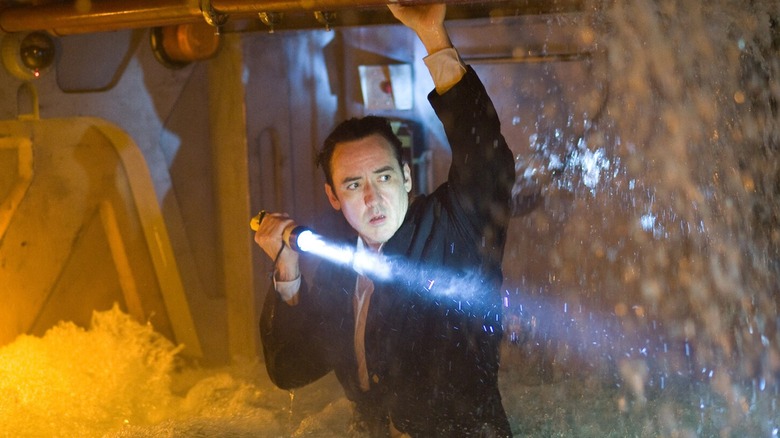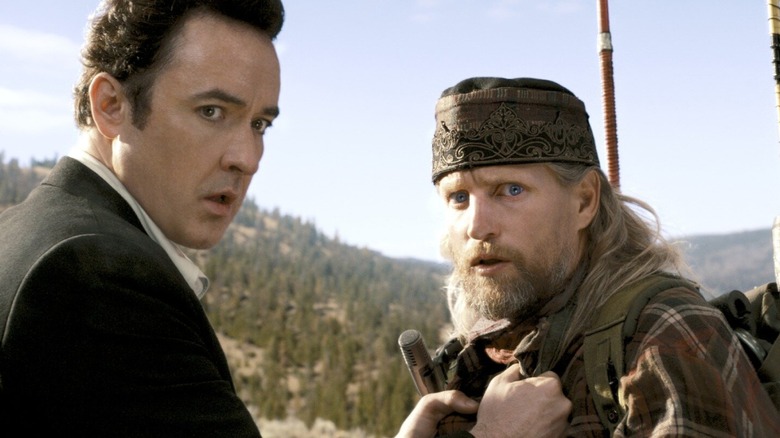NASA Was Furious Over A Sci-Fi Movie's Marketing Campaign
When done right, viral marketing campaigns can do immense favors for an upcoming theatrical release. Some campaigns take clever advantage of coinciding release dates (the "Barbenheimer" double-bill being a really successful example), while others concoct puzzles, websites, and scavenger hunts that tie in with the film's fictional universe to generate hype. Sometimes, these augmented reality marketing tactics take things too far, such as when the fake interviews and police reports to promote "The Blair Witch Project" ended up spooking audiences for real. But whereas a fictional horror story being presented as real-life crime can at least be fact-checked, a science-backed prophecy anticipating the end of the world is somehow trickier to refute. This is exactly where the viral marketing campaign for Roland Emmerich's disaster flick "2012" went wrong.
First, Columbia Pictures released a teaser trailer showcasing a tsunami crashing over the Himalayas. "Search for the truth," the trailer urged, along with the term "2012," as it would help create awareness about the Earth's inevitable destruction in the year 2012 (the trailer was released in 2009). The problem with this shoddy attempt to drive Google traffic in favor of Emmerich's film was that these clues were too vague to begin with, and could easily lead any curious person down a path marked with paranoid conspiracy theories about the apocalypse.
To make matters more complicated, the trailer was released alongside a fake website called the Institute for Human Continuity, which claimed that the titular scientific organization has been assessing threats to delay the inevitable for 25 years. It also came with the warning that there was a 94% probability of the world ending in 2012, so we might as well "register for the lottery" that'll decide who would be saved, and who wouldn't.
If you rolled your eyes after reading that, know that not everyone picked up on the obvious gimmick that was being used to market a disaster movie. In fact, some folks took it so seriously that NASA had to intervene and set the record straight.
One NASA astronomer spoke out against 2012's irresponsible marketing campaign
Humanity has always had a fascination with the possibility of the world ending, as it speaks directly to our deepest existential fears and everyday regrets. This impulse might be part of the reason why people were genuinely afraid of the warning issued by the fake website, and were even contemplating drastic measures, according to several news reports (via The Guardian). Things got so out of hand that NASA astronomer David Morrison received 1000+ public enquiries about the so-called apocalypse, since some were convinced that the organization was tracking the movements of a planet on a collision course with Earth. As a senior scientist at NASA Ames Research Center, Morrison couldn't help but speak out against Columbia Pictures' irresponsible marketing campaign.
In an interview with The Independent, Morrison revealed that some of the public inquiries expressed an inclination to self-harm, and this troubling sentiment was also shared by children who were unsettled by the fake news:
"They've created a completely fake scientific website. It looks very slick. It talks about this organisation having existed for 30 years and it consists of international scientists and business people and government officials having concluded that there is a 94 per cent chance of the Earth being destroyed in 2012 – and it's all made up, it's pure fiction. But obviously some people are treating it seriously [...] I've even had cases of teenagers writing to me saying they are contemplating suicide because they don't want to see the world end. I think when you lie on the internet and scare children in order to make a buck, that is ethically wrong."
I'm sure Columbia Pictures didn't intend to trigger such widespread panic. They might've believed that the website would be received in the same tongue-in-cheek vein as a faux riddle cooked up by the Riddler before a "Batman" movie is released. However, the end of the world is pretty serious business, and once hysteria spreads it becomes difficult to separate truth from fiction.
The campaign worked, though. "2012" ended up being one of the highest-grossing movies at the box office in 2009, even though it is one of Emmerich's painfully mediocre offerings.

